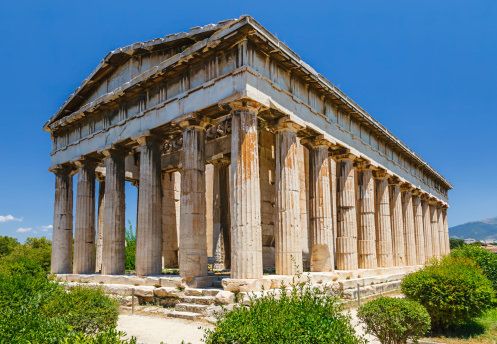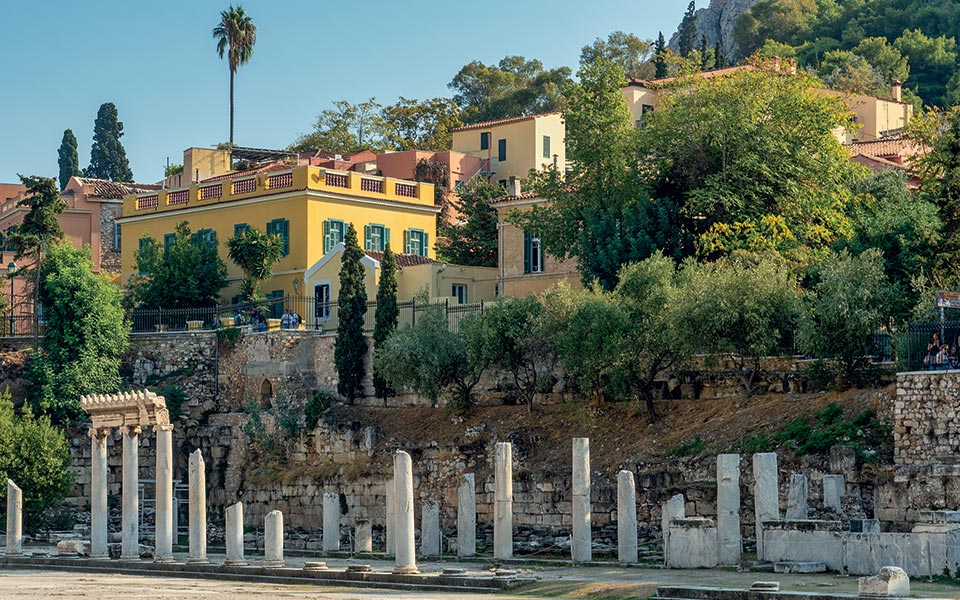The Ancient Agora of Athens stands as one of the most significant archaeological sites of ancient Greece. It was the center of public life in Athens, a place where politics, commerce, and culture intersected. Located at the foot of the Acropolis, the Agora was more than just a marketplace—it was the heart of Athenian democracy and a symbol of the intellectual and civic ideals that shaped Western civilization.
A Hub of Athenian Life: Politics and Civic Engagement
At its core, the Agora was the birthplace of Athenian democracy. It was here that citizens gathered to discuss and vote on laws, policies, and matters of governance. The Bouleuterion, a council house within the Agora, was where the city’s council met to deliberate and make decisions affecting the state. This system of direct democracy, where every citizen could participate in the decision-making process, laid the groundwork for modern democratic practices. The Agora was thus not just a space for commerce but also the crucible of ideas that defined the political landscape of Athens.

The Architectural Wonders of the Agora
Among the most impressive structures within the Agora is the Temple of Hephaestus, often regarded as the best-preserved ancient Greek temple. Dedicated to the god of craftsmanship and fire, the temple’s preservation is a testament to the architectural prowess of the ancient Greeks. Its columns, still standing tall, offer visitors a glimpse into the grandeur of Athenian religious architecture.

Another key structure is the Stoa of Attalos, a covered walkway that has been meticulously reconstructed to house the Agora Museum. The Stoa, originally built in the 2nd century BCE by King Attalus II of Pergamon, served as a space for public meetings and as a marketplace. Today, it serves as a cultural hub, offering a rich collection of artifacts that bring Athenian life to the present day.
The Cultural and Economic Importance of the Agora
Beyond its political role, the Agora was also a vibrant cultural and economic center. It was the site of daily markets where merchants sold goods, and the exchange of ideas was as constant as the exchange of products. The Agora was also a gathering place for philosophers and intellectuals. Socrates, Plato, and Aristotle were among the great thinkers who frequented the Agora, engaging in debates with citizens and laying the foundations for Western philosophy. It was here that the famous dialogues of Plato were likely conceived, and the ideas that would shape the intellectual future of Europe took root.

The Agora also housed several statues commemorating great figures in Athenian history. Among these was a statue of Pericles, the statesman who led Athens during its Golden Age and expanded its influence and cultural achievements. These statues served as both public displays of reverence and as symbols of Athenian pride.
From Roman Rule to Byzantine Decline
With the rise of the Roman Empire, the Agora continued to play an important role, though its functions evolved. During the Roman period, the Agora became a symbol of the city’s continued prominence under Roman rule. However, following the Byzantine era, the Agora gradually fell into disuse. Many of its buildings were repurposed or abandoned, and the once-bustling center of Athenian life was left to the sands of time.

Rediscovery and Modern Significance
In the 19th and 20th centuries, archaeological excavations began to uncover the ancient Agora, revealing its rich history and cultural significance. These excavations allowed modern visitors to reconnect with the past and explore the physical remnants of Athens’ golden age. Today, the Ancient Agora of Athens is not only an important archaeological site but also a powerful symbol of Athenian democracy, philosophy, and civic engagement.
The Ancient Agora offers us invaluable insights into the foundations of Western civilization. It stands as a testament to the ingenuity of the Athenians, whose ideas about governance, philosophy, and society continue to influence the world today. For anyone interested in the history of democracy, philosophy, or the cultural achievements of ancient Greece, the Agora remains a must-see destination that brings the past to life.

